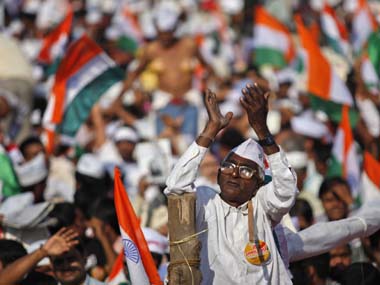By Shiv Visvanathan 2011 began like a silent film and suddenly transformed itself into the talkies. At the outset, inflation was high, scandals were rife, and yet citizens were silent, saving energy for household decisions. The scandals provided a kind of gender justice. Shiela Dikshit, Kanimozhi and Neera Radia created gender symmetry against Kalamadi, Raja and the corporate dons. The nation was soon busy celebrating what it called the Indian Century. The world cup victory under MS Dhoni gave us a sense of euphoria, of being top of the world. The world of advertising found new models in Virat Kohli. The other celebration centred on Salman Khan’s films; both, Ready — with its catchy silly song — and Bodyguard set the tenor of the early months. Dhinka Chika was the national ditty until Kolaveri di literally erased it from memory. There was a sense of shallowness, a feeling that nothing could stir the still waters of India. Despite inflation, despite the inertia of the world economy, Bollywood, Cricket and India seemed to march on. Politics seemed to have taken a backseat. Life was happy, content, and full of clichés and advertisements until a septuagenarian hawaldar decided things should be different. [caption id=“attachment_168745” align=“alignright” width=“380” caption=“Supporters of Hazare wave flags at his fast in Mumbai on 27 Dec. Reuters”]  [/caption] Anna Hazare was both mnemonic and iconic of the national movement. He reminded a new generation of the idealism of the national movement. He created a sense of continuity where an older and a younger generation found its solidarity in a battle against corruption. If one event marked the year, it was the rise and the rise of Anna Hazare. Whether it was Anna, Aruna or the later battles around Kudankulam, it was a period where civil society ambushed the state and the ossified political parties. The Arab Spring played out the same dynamic — with far greater success. Anna, the Arab Spring and Occypy Wall Street became the three critical movements of the year. Sometimes a year is a short time in politics especially when you want to look at structures. If you look at the last decade, the west looks gloomy and rusty – and continued to do so in 2011. For all its Tofflers and Huntingtons, its lofty theories of innovation, the West appears entropic. Every crisis produces folklore of response, a cult of leadership. It is here that Peter Drucker’s distinction between managers and leaders becomes critical. Drucker argued that leaders do the right thing and managers merely do things right. The first involves ethics, vision, imagination and invention. The second emphasizes procedure and technique. The current leaders of the West are at best managers. The Obamas, the Sarkozys, even Angela Merkel behaved like custodians of a system rather than path breaking innovators. Their approach to economic crisis is appalling. They have literally created a structure of internal colonialism in Europe. Countries like Greece, Portugal and Italy are being forced into a Shylockian bargain from which they may not recover. Democracy might have originated in the West but is today a frozen asset. Democracy has become a procedural exercise in formal participation and official representation in Europe and the United States. All the experiments in democracy are emerging in Latin America, India and Africa. 2011 was a year where the reality show called democracy ripped through the official facade. Popular protests across the world might eventually outlive the inertia of the economy. Or it may run aground, as did the Hazare movement over the past week. All in all, a confused year, full of hope and anxiety, pregnant with the new and yet still clinging to an old view of the world that refuses to go away. Shiv Visvanathan is a Social Science Nomad.
It was a year that celebrated the new — the power of the people — and underlined all that is now old and stale: the irretrievable decline of the West.
Advertisement
End of Article
Written by FP Archives
see more


)

)
)
)
)
)
)
)
)



